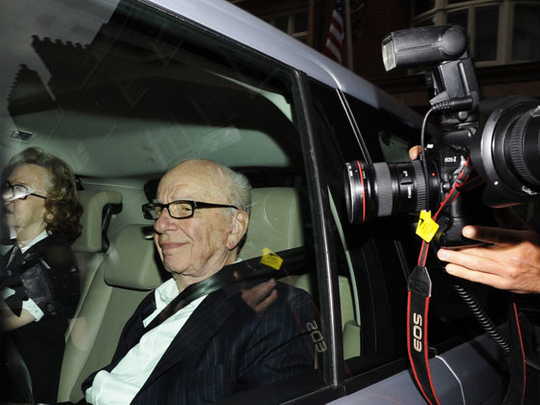
Not since the East India Company was finally brought to heel in the 19th century has political power over an influential private enterprise in Britain been so brutally enforced. On July 13, with MPs poised to approve by a staggering majority a motion telling Rupert Murdoch's News Corporation to retract its bid for full control of BSkyB, Britain's dominant satellite broadcaster, the company caved in and did just that. Meanwhile, Prime Minister David Cameron announced an inquiry into nefarious practices at the late News of the World, Britain's bestselling Sunday newspaper until it closed its doors in shame on July 10, and into press ethics and regulation more broadly.
The terms of trade have shifted swiftly and sharply against Murdoch in a way that Hosni Mubarak might appreciate. Only a couple of weeks ago Murdoch's papers, which have around two-fifths of Britain's national print market, gave him extraordinary access to the same politicians who now all condemn him as evil incarnate; that power, it has become clear, also helped his lieutenants at News International, the British newspaper arm of News Corp, to thumb their noses at the police investigating various phone-hacking claims. Yet ever since the allegation on July 4 that the News of the World had hacked into the phone of Milly Dowler, a murdered schoolgirl, things have disintegrated.
Dodgy methods
That is partly Murdoch's fault. He did not force those involved in the scandal to step down during the investigation — notably Rebekah Brooks, the editor of the News of the World during the Dowler case and the chief executive of News International during the alleged cover-up. (Brooks resigned on July 15 under intense pressure). Possible victims now include bereaved service families, the previous prime minister and the next king. Other Murdoch papers may also have been at fault; and there are suspicions that unrelated newspapers used dodgy methods too. Worst of all, the police are in the dock — both for failing to investigate the matter fully and, in some cases, for a cosily corrupt relationship with the press.
The consequences of this tawdry tale will be far-reaching, and so they should be. The law must be enforced, and those who broke it, or connived in covering up infringement, should be conspicuously punished. Cameron's public inquiry looks fierce enough. Having rightly attracted heavy criticism for hiring Andy Coulson, the editor of the News of the World when hacking was heaviest, the prime minister will presumably be more careful about whom he employs in future. Murdoch's clout will lessen. The press in general will be held to higher standards than it is now, and so too must the police. So most of the consequences will be good ones, but not all. Two risks stand out. The first is that the scandal may well change the shape of News Corp in ways that are less than ideal; the other is that it could knock the stuffing out of Britain's fierce, messy and vital press by provoking over-regulation. The first is to be regretted, but basically left to the law and the market; the second should be resisted.
Regulation
Murdoch is rightly criticised for fostering an attack-dog populist culture in British journalism (and elsewhere). But it has not been all bad. Long ago, he helped a dying Fleet Street burst its unionised bonds. A media baron who is a devotee of newspapers, a breed that is rapidly becoming extinct, he has patiently pumped money into "quality" titles such as the Times of London and America's Wall Street Journal. If he sold his British papers to, say, a Russian oligarch or Richard Desmond, the cost-cutting mogul behind the Express, how many journalists would cheer?
For the moment a disintegration of News Corp seems unlikely. The firm faces more accusations and legal challenges in Australia and America, and if any of its directors were to be found guilty of a criminal charge, that would present huge regulatory problems. Yet that could take years.
There is a much greater public interest in having the British press regulated in a fair way. Newspapers currently answer to the Press Complaints Commission (PCC), a self-regulatory body set up by the industry in 1991. The PCC is meant to enforce a code of conduct of its own devising, and deal with grievances brought to its attention; but its attempts to hold the tabloids to account have been pathetic. Many critics unsurprisingly now want Britain to move to statutory control. That would be a mistake. In the short term papers are bound to be better behaved — not least because they will see lawbreakers go to prison. And there is also a principle at stake: the media in a democracy must not be licensed by the state, especially one as centralised as Britain's. The press may have misbehaved badly; but it is the press, notably the Guardian, that has brought the behaviour at News International to light. Instead of the PCC, a new press body should be set up free from financial dependence on the industry, with a tougher code of conduct, powers to investigate compliance with it and others to penalise lapses from it. Ideally that would be coupled with reform of Britain's libel laws.
Lawbreaking companies and marauding journalists are a fact of life: they should be punished. But as with the East India Company, the real abuse of power — and the real threat to democracy — comes when commercial interest becomes intertwined with the state.









